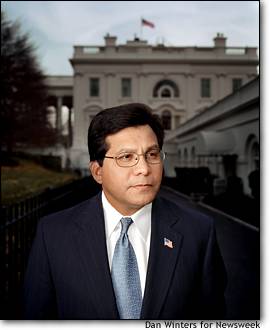|
|
THE SOFT-SPOKEN
former Texas judge has been a powerful force behind many of the Bush
administration’s most aggressive—and controversial—tactics in the war on
terror. Whether it’s setting up military commissions or liberally
reinterpreting the laws on state-sponsored assassination, he has helped
Bush take a muscular approach. “In a time of crisis he’s going to make
sure the president has his full range of powers as commander in chief,”
says Timothy Flanigan, Gonzales’s former deputy. “That may mean pushing
the envelope on the law, without exceeding it.”.gif)
 Director of
Special Projects, Alexis Gelber, joined us for a Live Talk to discuss
those selected and what's ahead in 2003. Read the transcript. Director of
Special Projects, Alexis Gelber, joined us for a Live Talk to discuss
those selected and what's ahead in 2003. Read the transcript.
.gif)
White House counsels
can usually stay out of the Washington crossfire. They’re not subject to
Senate confirmation, and they don’t have to wrestle the bureaucracy.
Instead, the president’s lawyer typically offers discreet advice on
legislation and helps the White House staff steer clear of ethical land
mines. In the months ahead, Gonzales will weigh in on a range of
politically charged legal issues—including Supreme Court cases on abortion
and affirmative action. But the 47-year-old lawyer may not be able to stay
below radar for long. Conventional wisdom in Washington is that two
Supreme Court justices—William Rehnquist and Sandra Day O’Connor—may
retire in the new year. And Gonzales is routinely mentioned as Bush’s
first choice to fill the next opening on the high court.
Gonzales has long been a Bush favorite. Friends say he passes
Bush’s all-important “good man” test: he is loyal, but not sycophantic. He
doesn’t grandstand. And he is able to reduce complicated issues to a
single sentence—a key attribute for a notoriously impatient president. The
men have history: a Texas native, Gonzales served as counsel to Bush when
he was governor. |
|
|
|
But it’s his
personal story that forms the emotional core of the relationship. The son
of migrant workers, Gonzales grew up in a house without running water and
was the first in his family to go to college. After Harvard Law, he became
the first minority partner at Vinson & Elkins, a posh Houston firm,
and eventually made it to the Texas Supreme Court. For Bush, Gonzales is a
resonant American symbol—a Hispanic who rose from poverty to a president’s
side. Placing him on the Supreme Court could help Bush with a key
political goal: attracting Hispanic and other minority voters to the
Republican Party.
A corporate lawyer most
of his career, Gonzales hasn’t left a long paper trail to scrutinize. So
far, liberals seem cautiously optimistic that he would be a moderate they
could live with. But some conservatives have quietly questioned his
ideological credentials—in a Texas abortion case, he voted to allow a
teenage girl to bypass a parental-notification law. Interviewed in his
corner White House office, he wouldn’t acknowledge that he’s a candidate
for the court. But in the same breath, he seemed eager to send a message
to anyone trying to divine his position on abortion. “It wasn’t a
constitutional issue,” he said, of the Texas case. “It was purely a
statutory interpretation question.”
Gonzales will face other tough questions. Some, even inside the
administration, ask whether he has the intellectual depth—and passion for
arcane legal issues—for the job. One administration official familiar with
his record describes his judicial opinions as “workmanlike but not
incisive.” Lately, some Bushies have been quietly floating another
possible spot for him instead: attorney general. Whatever job he gets,
Alberto Gonzales may soon be a household name. |
|






